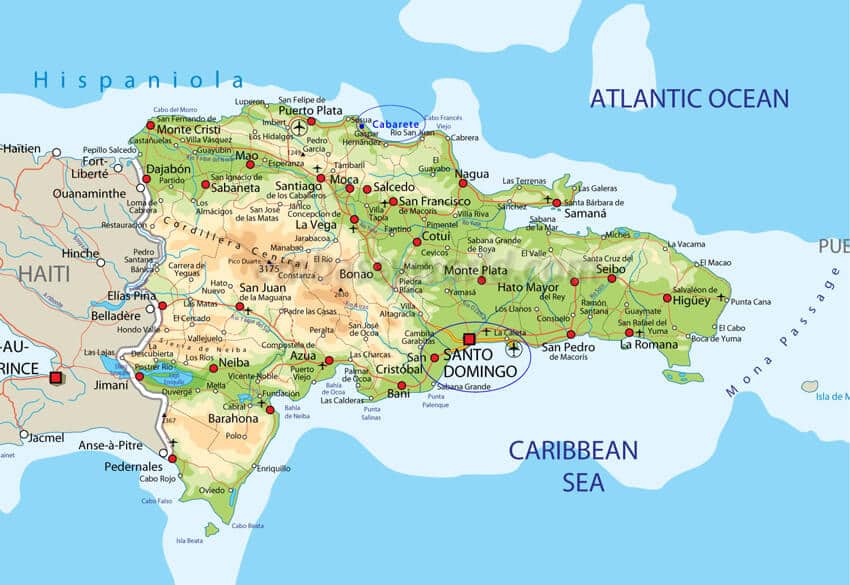Dominican Republic Migration
Since December 2017 the Migration Plan is applied in its entirety
The Dominican authorities have just toughened their immigration policy. The information had gone almost unnoticed last December but with the first people rejected at the customs of the airports and the statement from the French Embassy on March 7, there is no doubt.
In these last 15 years we have seen the entrance door to the Dominican Republic close to the new arrivals little by little and the demands have become more and more numerous at the time of applying for the green card. More recently, that is to say in the last 4 years, many justifying pieces and documents are requested in order to come and live here.
The Dominican Republic Migration Plan exists since 2004, so why is it being applied now?
On February 27, day of commemoration of National Independence, the Codue (Dominican Council of Evangelical Unity) issued a warning signal, considering that it was time to stop the current uncontrolled migration in the country, and for this reason recommended a transparent and fair migration policy.
Indeed, for several years, representatives of all sectors of Dominican society have demanded that migration be controlled and a serious planning of the number of foreigners that the country needs according to its capacity.
Fidel Lorenzo Merán, President of the Codue, highlighted several important issues directly related to migration problems such as the environment, citizen safety and crime reduction. But above all, he encouraged us to pray and think so that God will help the authorities to become aware of their role in preserving the Nation’s identity and its Christian values, denouncing personal ambitions and murky political maneuvers.
Therefore, the problem must be dealt with in a firm and responsible manner, in the exercise of the sovereignty of the country and analyzing the impact that it could have in accepting a migratory burden that exceeds the economic and social capacity, said the President of the Codue.
The following day, that is to say on February 28, the Dominican Minister of Foreign Affairs, Miguel Vargas, informed us of the creation of a National Plan of Action on Immigration Matters, which will allow us to measure progress and supervise the correct management of internal and external migratory initiatives of the Dominican territory.
He then indicated that the Migratory Governance Index of the Dominican Republic, which explores the different policies adopted by governments against the phenomenon of human mobility and the consequences they have on nations and individuals, will be one of the elements that will be used in the development of the new instrument.
The Dominican Republic Migration Plan will also use the goals of the Sustainable Development Goals of the Global Compact on Migration and the lines of action of the National Development Strategy to combine a unique strategic document with clear objectives, indicators and means of verification. Indian.
The Ministry of Foreign Affairs (MIREX), with the assistance of its Inter-Institutional Technical Commission on Migration Matters, has already started with actions in the various sectors in migration and related areas.
During his speech, the Minister of Foreign Affairs insisted on the idea that the management of immigration is exclusively and totally at the discretion of the State that applies it.
There is no international instrument, treaty or agreement that could force the Dominican Republic to modify the way it manages its migratory flows, he said.
He also highlighted that the Dominican Republic demonstrated to have a high level in the governance of migration policies with a global approach, the promotion of safe and orderly immigration, the solidity of the legal framework for migration and the existence of interconnected institutions.
As he emphasized, the country developed a unique process in this sector, which allows not only to enter the data in the different institutions, but also its exchange and verification, demonstrating that the Dominican State is in harmony and committed to political coherence and synergy. interinstitutional.
Speaking clearly, Dominicans have helped in the best way possible by letting part of the Haitian population enter after the 2010 earthquake, avoiding a serious social and economic crisis in Haiti, during all these years.
Then he came to the Venezuelan migratory wave of the last three years, and the Dominican Republic, faced with nascent social and economic problems, is forced to revise its migration policy.
Since January 1, 2018, we have been able to verify on several occasions the presence of migratory services in Las Terrenas, controlling all nationalities without exception.
If before you could stay more than 30 days in the Dominican territory and therefore exceed the term granted as non-resident by the tourism card (or without Dominican identity card if you prefer), with no consequence other than paying a fine at the time of your exit and had the possibility to return then without problem, this time it’s over.

If it exceeds the 30-day period, (or has exceeded it in the past), it will still pay the fine when leaving the Dominican Republic, but it runs the risk of being rejected at the time of entering the Dominican territory again with a simple Tourist Card.
The payment of the exit fee is a type of fine for having exceeded 30 days and it is not a pardon, and since you have violated the rule in the past, customs can consider that it will do it again and be rejected at the entrance.
The most convenient, if you are in this situation, is to carry out the necessary procedures before the Dominican Consulate of your country of origin or current residence to obtain either a Tourism Visa, or a Residence Visa, in order to enter back to the Dominican Republic.
This means that there will be no more between two: you either stay as a tourist, with your passport and you are entitled to a maximum of thirty days in the Dominican territory, or you make the necessary paperwork to obtain your residence card and continue to benefit from all the rights as a resident with an unlimited stay.
As in all the customs of the world, each case is studied separately. Maybe nothing will happen to him, or maybe he will. The risk is of course greater for people who in fact live in the Dominican Republic all year without documents, who are strongly discouraged from leaving the Dominican territory and returning without a Residence Visa duly obtained in their country of origin or of current residence.
Read more here about Dominican Republic Migration and Residency

